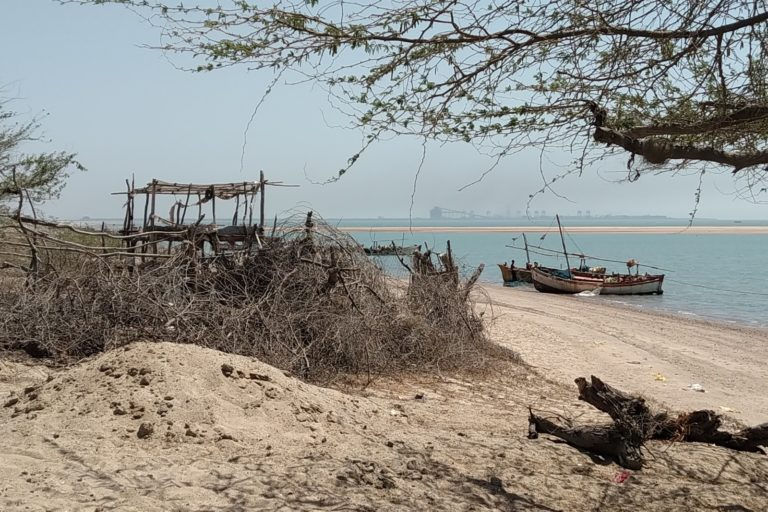March of industrialisation tramples Kutch’s coastal ecology
- Azera Rahman

- May 1, 2019
- 7 min read
Updated: Jul 17, 2021
For Mongabay.com

Thermal power plants in Mundra, Kutch, have nearly wiped off Pagadia fishing, a traditional form of fishing in which only nets are used.
Coal ash from the power plants has brought down the market value of dry fish. It is also a health hazard.
Mangrove destruction because of industrialisation is a concern in this coastal area.
The Machimar Adhikar Sangharsh Sangathan (MASS) has sued the International Finance Corporation of the World Bank, which has financed a power plant in Mundra, in a U.S. court for failing to ensure compliance of the environmental and social conditions of the loan.
“Like fish trapped in a net,” Jam Ismael Ali smiled at the irony of the simile drawn to explain his own situation. One among the few remaining Pagadia fishermen in the Kutch region, Ismael pointed at the massive structure of an ultra mega power plant releasing water from its outfall channel. Another power plant stands on the other side.
“They said it (power plant) would not adversely affect us. Truth is, it has driven away the fishes and nearly wiped off Pagadia fishing,” he said.
Ismael Ali does not have scientific data to support his claim. But when he, and other traditional fishermen like him in Traghadi, talk about the drastic drop in their catch ever since the 4000 MW Tata Mundra Power Plant came up in Tunda, in the vicinity of their village less than a decade ago, it strongly indicates the correlation.
“Before the thermal power plant came up, we used to fish here, in this intertidal zone and get 60-70 kg of fish every day. We now barely get two kilos,” he said.
Pagadia fishing nearly wiped off
Pagadia fishing is a traditional form of fishing in the intertidal waters of Kutch wherein the fishermen use only nets; pag from Pagadia means foot, indicating they go as deep into the water as their feet can take them. Mundra falls within the seven-kilometre intertidal zone where these fishermen live, and this type of fishing typically takes place during the “off-season”, between April/May to August, when the monsoon winds pick up, making it unsafe for boats to venture deep into the sea.
“For as long as I can remember, this type of fishing helped us sustain during the off-season, and we would get a very good catch. The women would sell the fishes in the nearby town and villages,” Ismael said. “But now, because there is not enough to sustain ourselves and we don’t know any other work, the fishermen families go to moneylenders to help them see through this period. The debt builds up, and the rest of the year goes in repaying that.”

Hussain and Ismael (L to R). Photo by Azera Parveen Rahman.
The imported coal-fired thermal plant became functional in 2012, but Hussainbhai,another Pagadia fisherman of the same village, said that not only were they “not consulted beforehand”, but were later told “the water from the outfall channel would be let off in a different direction” that would not affect them in any way.
“However, the released water which is much hotter—seven to eight degrees warmer—came where we typically went fishing. Over time, the fishes—like pomfret and lobsters that were found in abundance earlier— started disappearing. Malai, Ser, Khagai (local names), all migrated elsewhere. Now we mostly get small fishes, that’s it,” he said. The Gulf of Kutch has nearly 200 species of fishes.
Standing close to the Tata Mundra Power Plant is the Mundra Power Project by the Adani group.
Bharat Patel, general secretary of the Machimar Adhikar Sangharsh Sangathan (MASS) which works for the fishermen community, said, “The Tata Mundra Power Plant uses an open-cycle cooling system and releases 6,000 lakh (600 million) litres of water of higher temperature through its outfall channel, per hour. The Adani power project has a somewhat lesser impact because it uses a close-cycle cooling system, which means it cools the water before releasing it back into the sea; it releases 600 lakh (60 million) litres per hour.”
“Although a 2015 law required all plants to install cooling towers to minimise thermal pollution by the end of 2017, the Tata plant has failed to do so,” he added.
In 2008, the Bombay Natural History Society (BNHS), a pan-India wildlife research organisation, assessed the possible future effect of the Tata Mundra Power Plant on the surrounding coastal and marine biodiversity, so that proactive measures could be taken to “minimise the ecosystem damage”.
Published on the company’s website, the report says that the 4.9 km long outfall channel through which the sea water is released into the open water of the Gulf of Kutch, crosses the Modhva creek. “The channel will be carrying the saline water having seven degrees higher than the intake channel seawater,” it said.
“The shoreline, intertidal area and the open sea adjacent to the outfall channel is rich in fisheries resources including elasmobranch (sharks). Traghadi, Salaya and Modhva have been considered as important fish landing centres. All these fall in the impact zone of the outfall channel,” the report said. “However this is a temporary (fishermen) settlement and is active only during the fishing season, i.e. September to May.”
Nearly 10 years on, the local fishermen say that not only has fishing during the peak season been affected — they now have to venture deeper into the sea, often risking venturing into international waters — but also during the off-season, “nearly wiping away Pagadia fishing”.

An abandoned fisherman’s settlement (left) near the outfall channel of the power plant in Mundra. Photo by Azera Parveen Rahman.
Patel said that in the Mundra-Anjar region, “10,000-15,000 fishermen have been directly impacted by the industrialisation process along the coastline.”
“Kutch also supplies the bulk of crude oil production. This and other factors have led to busy port traffic that also affects fishermen,” he added.
Coal ash from thermal power plants threatens life and livelihood
The BNHS report also mentioned the adverse impact of high-temperature water on the breeding ecology of turtles. This area is an important nesting site for two endangered species— green sea turtle and the olive ridley turtle.
Another impact on the fishermen is by the coal ash generated by the power plants. Although the Tata Mundra Power Plant says that all the coal ash it generates is stored within the plant premises and dry ash is transported in sealed carriers to the cement industry, the locals complain of its adverse effect on them.
Gajendra Sinh, the Panchayat leader of Navinal village in the same area said, “The coal ash from the power plants stains the fish that are left to dry, thereby reducing its market value by a big margin.”
Navinal has at least 40 fishermen families. Coal Kills, a joint report by the Conservation Action Trust, Urban Emissions and Greenpeace estimated that the two coal-fired power plants in Mundra put the lives of 100-120 people of the region at risk of premature death.
The clash between industrialisation and coastal ecology in Mundra with a direct socio-economic impact on local population is just a sample of what is happening along Kutch’s, and the rest of Gujarat’s, coastline. Nearly 60 percent of Gujarat Industrial Development Corporation (GIDC) undertakings are along the coastline. In Kutch, particularly post the 2001 Bhuj earthquake, there has been a spurt in industries taking root, mainly cement, salt, and, along the coastline, of thermal power plants and ports.
Mangroves are under threat too
Yet another concern from the rapid industrialisation along Kutch’s coastline, particularly by the salt industry, is mangrove destruction. Mahendra Bhanani of Sahjeevan, an NGO that works on the welfare of pastoralists and for the unique Kharai camel of Kutch, said that industries typically block a natural creek and create bunds that don’t allow natural tidal water to come in. This dries up the mangroves and makes it easier for heavy machinery to uproot them, and create salt pans.
The Rabari community—the tribe that typically owns the threatened species of Kharai camels that are highly dependent on the mangroves for feeding—near Tunda, voice a similar concern. The warmer-than-normal water from the power plants, they say, has been detrimental to the mangroves. In a village here, there was a time when almost every family owned Kharai camel. When the two power plants came up, its access to the sea was cut off by the canal and the conveyor belts built by the companies. So they now have to walk a much longer route to reach the sea, for the camels to swim to the mangrove islands. From around 2,500 camels a decade back, less than 200 remain in the village today.
No hope from political leadership
At a time when Indian political parties are going all out to appease voters and promising to meet their demands in the backdrop of the national elections, these local communities have little hope from them. For the villagers of Traghadi for example, politics makes no difference to their lives.
“It doesn’t make any difference to us if Modi comes back to power or Rahul [Gandhi]. We are on our own,” the Pagadia fishermen said.

(L to R) Bharat Patel, Jam Ismael, Hussainbhai. Photo by Azera Parveen Rahman.
But their statement is not completely devoid of hope. MASS filed a suit against the International Finance Corporation (IFC) of the World Bank—which had financed the Tata power plant—in the U.S. Federal Court in 2015 for failing to ensure that the plant complied with the environmental and social conditions of its loan. Although the U.S. district court ruled that the IFC had “absolute immunity”, the U.S. Supreme Court, on February 27 this year, gave a ruling in the Kutch fishermen’s favour, saying that the IFC does not have absolute immunity and can be sued.
“This was a landmark moment for us,” said Patel, “We are now pursuing the case legally.”
As part of their corporate social responsibility, the thermal power plants in Tunda have supplied drinking water to the villages in the vicinity. “We don’t want the lights, the water, nothing. Just give us our livelihood back and we will take care of ourselves,” Ismael said.
There was no official response from the Tata and the Adani group despite attempts to get one. The BNHS did not respond either.
However, in a recent development, an official statement from the Tata group said that its “Mundra plant is making consistent, significant losses” and that its experience (in Mundra) has “helped convince the company to turn away from new coal-fired power”.




Comments